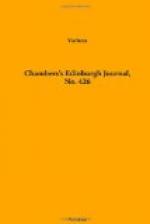‘What’s the use?’ says I: ’there’s no light, and the hands are all fast asleep.’
‘No,’ says he; ’to the captain’s cabin I mean. There’s a lamp there; and we can hear the oars of the boat, and be on deck again, and no one the wiser.’
Well, mates, I had some curiosity to get a glimpse of the captain’s cabin, where I very seldom went, and never stayed long: so down we went, lighted up the lamp, and looked about us. There wasn’t much, however, to see. It was a black little hole, with a brass stove and lockers, and a couple of berths, larboard and starboard, and a small picture of a fore-and-aft rigged schooner, very low in the water, and looking a reg’lar clipper; and no name to her. Well, mates, all at once I caught sight of a pack of cards lying on a locker. ’Here’s a bit o’ fun,’ says I; ‘Lawry, let’s have a game;’ and he agreed. So down we sat, and began to play ‘put.’ A precious greasy old lot of cards they were; and so many dirt-spots on them, that it required a fellow with sharp eyes to make out the dirt from the Clubs and Spades. However, we got on somehow. When one was ready to play, he knocked the table with his knuckles, as a signal to the other; and for hours and hours we shuffled and dealt and knocked until it was late in the night, which I ought to have told you was Saturday night. At last, just as we ended a game, and when we were listening if a boat was coming, before beginning another, we heard the Yarmouth clocks ring twelve.
‘Put up the cards,’ says Lawrence; ‘I’ll not play more.’
‘Why not?’ says I.
‘Because,’ says he, and he stammered a little—’because it’s Sunday.’
Well, mates, I had forgotten all my notions of that kind, and so I laughed at him. But it was no use.
‘Them,’ says he, ’that plays cards on a Sunday, runs a double chance of death on Monday.’
His mother had told him this, and so he refused out-and-out to go on. ‘Well,’ says I, ‘I aint afraid, and I’d play if I had a partner.’




